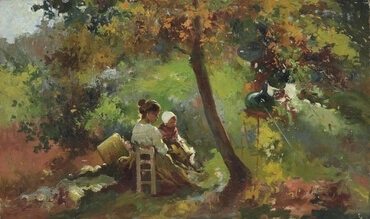1
Ljubi, dakle, Gospoda Boga svog, i izvršuj jednako šta je zapovedio da izvršuješ, i uredbe Njegove, i zakone Njegove i zapovesti Njegove.
2
I poznajte danas šta vaši sinovi ne znaju niti videše, karanje Gospoda Boga svog, veličanstvo Njegovo, krepku ruku Njegovu i mišicu Njegovu podignutu,
3
I znake Njegove i dela Njegova, šta učini usred Misira na Faraonu, caru misirskom i na svoj zemlji njegovoj,
4
I šta učini vojsci misirskoj, konjima i kolima njihovim, kako učini, te ih voda crvenog mora potopi kad vas terahu, i zatre ih Gospod do današnjeg dana,
5
I šta vama učini u pustinji dokle ne dođoste do ovog mesta,
6
I šta učini Datanu i Avironu, sinovima Elijava sina Ruvimovog, kako zemlja otvori usta svoja i proždre njih i porodice njihove i šatore njihove i sve blago njihovo što imahu, usred Izrailja.
7
Jer vaše oči videše sva dela Gospodnja velika, koja učini.
8
Zato držite sve zapovesti, koje vam ja danas zapovedam, da biste se ukrepili i nasledili zemlju, u koju idete da je nasledite;
9
I da bi vam se produžili dani u zemlji, za koju se zakle ocima vašim da će je dati njima i semenu njihovom, zemlju, u kojoj teče mleko i med.
10
Jer zemlja u koju ideš da je naslediš nije kao zemlja misirska iz koje ste izišli, gde si sejao svoje seme i zalivao na svojim nogama kao vrt od zelja;
11
Nego je zemlja u koju idete da je nasledite zemlja u kojoj su brda i doline, i natapa je dažd nebeski;
12
Zemlja kojom se stara Gospod Bog tvoj i na koju su jednako obraćene oči Gospoda Boga tvog od početka godine do kraja.
13
Zato ako dobro uzaslušate zapovesti, koje vam ja zapovedam danas, ljubeći Gospoda Boga svog i služeći mu svim srcem svojim i svom dušom svojom,
14
Tada ću davati dažd zemlji vašoj na vreme, i rani i pozni i sabiraćeš žito svoje i vino svoje i ulje svoje;
15
I za stoku ću tvoju dati travu u polju tvom; i ješćeš i bićeš sit.
16
Čuvajte se da se ne prevari srce vaše da se odmetne i služite tuđim bogovima i poklanjate im se;
17
Da se ne bi razgnevio Gospod na vas i zatvorio nebo da ne bude dažda, i zemlja da ne da roda svog, te biste brzo izginuli u dobroj zemlji koju vam Gospod daje.
18
Nego složite ove reči moje u srce svoje i dušu svoju, i vežite ih za znak sebi na ruku, i neka vam budu kao počeonik među očima vašim.
19
I učite sinove svoje govoreći o njima kad sediš u kući svojoj i kad ideš putem, i kad ležeš i kad ustaješ.
20
I napiši ih na dovratnicima doma svog i na vratima svojim,
21
Da bi se umnožili dani vaši i dani sinova vaših po zemlji, za koju se zakleo Gospod ocima vašim da će im je dati, kao dani nebu nad zemljom.
22
Jer ako dobro uzdržite sve ove zapovesti koje vam ja zapovedam da tvorite ljubeći Gospoda Boga svog, i hodeći svim putevima Njegovim i Njega se držeći,
23
Tada će oterati Gospod sve ove narode ispred vas, i nasledićete narode veće i jače nego što ste sami.
24
Svako mesto na koje stupi stopalo noge vaše, vaše će biti; od pustinje do Livana, i od reke, reke Efrata, do mora zapadnog biće međa vaša.
25
Neće se niko održati pred vama; strah i trepet vaš pustiće Gospod Bog vaš na svu zemlju na koju stupite, kao što vam kaza.
26
Gle, iznosim danas pred vas blagoslov i prokletstvo:
27
Blagoslov, ako uzaslušate zapovesti Gospoda Boga svog, koje vam ja danas zapovedam;
28
A prokletstvo, ako ne uzaslušate zapovesti Gospoda Boga svog nego siđete s puta, koji vam ja danas zapovedam, te pođete za drugim bogovima, kojih ne poznajete.
29
I kad te uvede Gospod Bog tvoj u zemlju u koju ideš da je naslediš, tada izreci blagoslov onaj na gori Garizinu, a prokletstvo na gori Evalu.
30
One su s one strane Jordana, idući k zapadu, u zemlji Hananeja koji žive u ravni prema Galgalu kod ravnice moreške.
31
Jer ćete preći preko Jordana da uđete u zemlju koju vam daje Gospod Bog vaš da je nasledite, i nasledićete je i nastavaćete u njoj.
32
Gledajte, dakle, da tvorite sve ove uredbe i zakone koje ja danas iznosim pred vas.







